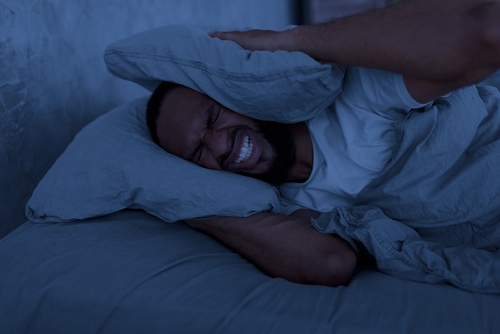Even faint tinnitus at night can disturb your sleep. But the ringing in your ears doesn’t have to keep you awake if you have a bedtime routine.
The problem with tinnitus at night.
The quiet environment of your bedroom at night makes your tinnitus more noticeable and seem louder. With nothing else to concentrate on, you focus more and more on the ringing in your ears. This causes insomnia, which leads to an increased perception of your symptoms. This creates a cycle that can keep you awake all night.
There are two ways to deal with tinnitus at night that can help you break this pattern: Creating a routine for sleep and preparing the perfect place to sleep in.

Create a routine for sleeping with your tinnitus.
Getting a good night’s sleep is your best defense for tomorrow’s tinnitus. Rested and relaxed, your stress level will be low. As a result, you will be well prepared to tolerate your symptoms, perhaps even noticing a reduced perception of your symptoms.
Setting a routine for sleeping with tinnitus is easy; following it every night, however, will require no small commitment on your part.
Related: https://lifewithtinnitus.com/tinnitus-habituation-how-to-cope-with-ringing-in-your-ears/
Set a nightly sleep goal.
Selecting this goal will take some experimenting. Eight hours of sleep is an excellent place to start, but every individual will differ. Do not be tempted to skip this part; now, set a specific number of hours before moving on.
Creat and commit to a sleep schedule.
Using the number of hours you set for your sleep goal, work backward from when you must wake up. For example, if you must be up by 6 a.m. and have a sleep goal of eight hours, your bedtime is 10 p.m.
This may be the hardest step to accomplish routinely, but it is critical. You are preparing your brain, and your body for what they will feel is a marathon. Expect to fail, over and over again, until the three of you build a habit together.
Maintain this sleep schedule every night, including vacations, holidays, and weekends. Resist the urge to oversleep, sleep in, or take naps during the day. Strict adherence will significantly assist you in sticking to your sleep schedule.

Limit your alcohol, nicotine, and caffeine intake.
At a minimum, stop consuming alcohol at least three hours before bedtime. Stop drinking all caffeinated beverages at least six hours before retiring for the evening. Avoid smoking, vaping, or using any other nicotine delivery system at least two hours before going to bed.
Go dark and stop eating.
Dim the house lights, shut off your gadgets, and stop eating two hours before bedtime. This gives your body time to produce a sleep hormone known as melatonin naturally. Melatonin plays a vital role in your body’s sleep-wake cycle, specifically telling it when it is time to sleep. Unfortunately, cortisol and light can inhibit your body’s ability to produce melatonin.
Late-night snacking or eating a large meal before bed may indeed make you sleepy, but several hours later, your blood sugar levels will crash. This crash will cause your cortisol levels to rise, diminish your melatonin production, and cause you to wake up.
Eating just before bed can also make it harder to fall asleep for some, causing indigestion, heartburn, or the need to interrupt your sleep with a midnight bathroom trip.

Bright lights from your television, iPad or telephone have the exact opposite effect the dark of night has on your melatonin production. As one study concluded, “These findings indicate that room light exerts a profound suppressive effect on melatonin levels and shortens the body’s internal representation of night duration. Hence, chronically exposing oneself to electrical lighting in the late evening disrupts melatonin signaling and could therefore potentially impact sleep, thermoregulation, blood pressure, and glucose homeostasis.”
Television is doubly bad for your sleep cycle. Just think about it, how many programs are made NOT to be exciting?
Related: https://lifewithtinnitus.com/what-is-a-tinnitus-spike/
Distract and relax yourself.
One hour before bed, use a tinnitus distraction technique to calm yourself down. A fan favorite? Tidying up the house while listening to an audiobook or a free podcast set a volume just slightly above the sound of your tinnitus.
A distraction like this uses physical movement, a slight tinnitus masking effect, and concentration (to keep up with the narrator) to lower your current tinnitus perception. This serves to relax you in several ways. You get to enjoy a good story and take a break from today’s troubles mentally. You know you will awake to clean home and a sense of already having a command of the day. And you avoid letting the ever quietening approach of bedtime draw your attention to your tinnitus in the first place.
Related: https://lifewithtinnitus.com/heres-how-to-get-better-from-tinnitus/
Creating the perfect place to sleep with tinnitus at night.
The best place to sleep with tinnitus at night is in a cave. Think like a bear and go for cool, dark, quiet, and safe. And the place is reserved only for sleep and sex.
Not too hot, not too cool—the perfect temperature for your bedroom.
If your bedroom is too hot or cold, you are likely to wake up during the night to either kick off the sheets or grab an extra blanket. Aim for a 60-67 degree room temperature.
Get some sun on your face during the day to keep tinnitus at bay.
The sun, especially on your face early in the morning, can help you fall asleep at night. Sounds crazy, but your sleep-wake cycle is like a clock with a wake-up alarm. Morning sunlight warms you up and produces cortisol—all designed to get you up and started on your day.

On the other hand, your bedroom needs to be as dark as possible. Remove anything with a light, even if it’s just a power indicator. If you still use an alarm clock, make its display is dim if not turned off. If any light must be used, make sure it is red.
If possible, install heavy curtains or shades to block out streets lights and passing car headlights. If there is any chance you may be exposed to artificial light while sleeping, consider wearing a sleep mask.
A quiet sleeping space is a two-edged sword. One side guarantees a sound will not awaken you; the other makes your tinnitus more noticeable.
Let’s deal with the worst-case scenario. You do not have any control over other sounds entering your bedroom, and your tinnitus is keeping you from getting to sleep.
My solution is controversial. I suggest you use earplugs and then try the 15 Minute Challenge, specifically, “How to get to sleep quickly.” Yes, at first, your tinnitus will be much louder than usual, but that is the point of the challenge in the first place.
Try it. I’ll bet you fall asleep halfway through it.
